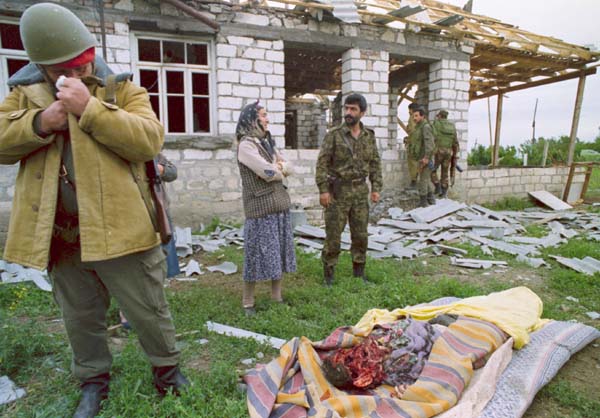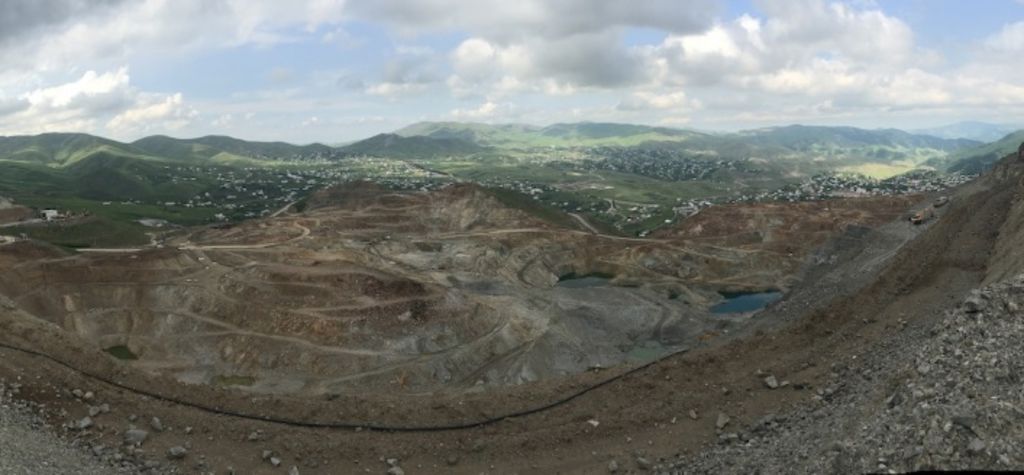Kosovo’s declaration of independence on February 17, 2008 has sparked extensive discussions about its possible implications for the Nagorno-Karabakh conflict, with some statements, including some by Armenians, suggesting that it completely changes the situation in the South Caucasus, and others including those by the Azerbaijani and some Western governments arguing that it has no applicability to territorial disputes there.
Recent Armenian statements suggest that Kosovo’s declaration of independence and the international recognition it has received have the potential to change security dynamics in the region. The Karabakh de-facto leader Bako Sahakyanfoll stated that “If Kosovo’s independence contributes to Karabakh’s independence, we will only be happy.” [1] Armenian Prime Minister Sarkisyan warned that Kosovo “will boost Karabakh recognition drive”, a position he claimed was viewed favourably. [2] His views were echoed by Georgy Petrosyan, Nagorno-Karabakh’s de-facto foreign minister, who argued that “We are confident that the recognition of Kosovo by the international community or by individual countries will strengthen our position in negotiations to resolve the conflict with Azerbaijan.” [3] Armenia’s foreign minister stated on February 24 that “granting independence to Kosovo, the international community violated the legal norms but forgot Karabakh. Unlike Kosovo, no one granted independence to Nagorno-Karabakh.” [4]
The Azerbaijani government expressed its opposition to Kosovo’s recognition, declaring, unlike many states that remain equivocal, that it would not offer recognition. It further announced, as what can be taken to be a tangible expression of protest, that its 34-soldier contribution to the peacekeeping mission in Kosovo will be withdrawn. [5]
Thus, Kosovo has unquestionably featured in recent Armenian and Azerbaijani statements over Nagorno-Karabakh. However, despite Armenian hopes and Azerbaijani fears, there are many reasons to think that Kosovo will in fact have little impact on the course of events concerning this conflict. Some of them have to do with the US-led position on Kosovo’s new status and others with the Russian Federation which would be the major outside actor that might institute changes.
The United States and other Western countries have stressed that Kosovo is a unique case. The rationales for this can be elaborated and debated; for practical purposes, however, this signals that the West will not allow for a “Kosovo precedent” to be appropriated for any other purpose and to any other geopolitical context (see Fawn 2008). That stance is unlikely to deter some committed secessionist movements from trying to exploit such an idea, but it means that anyone who does is unlikely to secure the international recognition that effective independent statehood requires. Indeed, when Kosovo declared independence, its leaders reiterated the Western view that Kosovo is unique and is not a precedent for elsewhere, a view that senior American officials have welcomed and repeated in conversations with the Azerbaijani government. [6]
To say this, however, is not to suggest that the West is entirely united on this point. The European Union, for example, has been unable to agree on a common approach to Kosovo, and as of this writing, only 21 of its 27 member states have extended recognition, among them the United Kingdom, France and Germany.
Meanwhile, the Serbian government has tried to minimize Kosovo’s success in attracting international recognition of its independence. Foreign Minister Vuk Jeremić noted that “others in Europe” (naming only three) had withheld recognition, as had many other leading global and regional players, including Brazil, China, Egypt, India, Israel, Russia and South Africa, and that Kosovo had only been recognized by 40 of more than 200 UN member states. [7]
With respect to the implications of Kosovo’s status for the South Caucasus, of course, the exact number of governments that have recognized its independence may be less important than the attitude of the Russian Federation. Moscow, along with Beijing, seems intent on blocking Kosovo’s admission to the United Nations and insists that any decision about Priština’s status must be approved by the UN Security Council where both Russia and China have the power of veto. This is essential because Resolution 1244 of June 1999 which ended the NATO bombing campaign ensures that Kosovo’s fate must – again, at least in de jure terms – be settled there.
Kosovo, according to American diplomat Richard Holbrooke, was President Vladimir Putin’s “biggest international test.” [8] The Russian leader may feel compelled to take a stand for both domestic and foreign policy reasons. But Moscow’s ability to exploit the situation further is limited by six factors, all of which are relevant to the possible implications of Priština’s action for Nagorno-Karabakh.
First, despite its rhetoric against Kosovo, Moscow has not taken any concrete steps either against Priština’s or in favour of the so-called “unrecognized” states, despite their efforts to get the Russian government to do so. Consequently, it appears unlikely that the Kremlin is planning to move anytime soon.
Second, Russia finds itself in a position that could prove counterproductive. If it opposes recognition of Kosovo based on the moral and legal high ground, it can hardly move to recognize anyone else, something that would undercut what Moscow presents as its principled position.
Third, and probably far more important, are the practical implications for Russia itself from such a stand. Moscow cannot afford taking any step that might create additional precedents for declarations of independence, or border redrawing, by non-Russian republics in its own North Caucasus.
Fourth, any changes by Russia to boundaries in the Caucasus could also give Georgia irrefutable evidence to support its claims that Russia is seeking to dismember it. While NATO and the EU do not welcome a conflict-ridden state as a new partner or member to be, Western support for Georgia is nevertheless very strong and recognition of Abkhazia or South Ossetia could realize a Western presence, including military, something the Russian government certainly does not want to see happen.
Fifth, even Russian statements have moved away from the arguably principled idea of “universal application” to differentiated between which of the post-Soviet de facto states are eligible. In official Russian statements, it is the two entities in Georgia that feature most often, then to a lesser degree Transdniestria; with infrequent, and indeed in many cases, no mention of Karabakh (Fawn 2008).
Given this Russian position, the leaders of the first three de facto states have been careful not to extend the Kosovo “precedent” to Karabakh. [9] Indeed, they prepared a joint statement in response to Kosovo that made no reference to the fourth “unrecognized” state. [10] And even Yerevan has suggested that it does not view international recognition for Kosovo as the occasion for Armenia itself to recognize Karabakh’s independence immediately. [11]
And sixth, Moscow’s approach to all of these conflicts is a product of its relationship with the countries immediately involved. Many commentators see Russia as seeking to use Abkhazia and South Ossetia as tools to influence Tbilisi, and Transdniestria to influence Chisinau. In contrast, Russia retains good relations with both Armenia and Azerbaijan and stands inevitably to lose one set of those relations by a policy stand that changes Nagorno-Karabakh’s current, if also disputed, status.
Given all these reasons, it appears likely that Moscow will be satisfied by what it is packaging as a moral victory, even though Kosovo is likely to remain independent. After all, President Putin has argued that “Russia’s position on [Kosovo] is now winning support among those politicians in Europe who, despite the political pressure of bloc discipline, particularly within NATO’s structure, show political courage, demonstrate independence of judgment and, in the best traditions of European political culture, seek to extend the principles of democracy and justice to international affairs.” [12]
There have been recent positive views by outsiders that Nagorno-Karabakh could be solved. At least Kosovo’s independence is unlikely to enflame the conflict, or even to have a serious negative impact on the status quo; but it is also extremely unlikely to afford new possibilities in resolving it.
Reference
Fawn, Rick (2008). “The Kosovo – and Montenegro – Effect”, International Affairs, Vol. 84, No. 2, March, pp. 269-94.
Notes
[1] Sahakyan, Bako. “If Kosovo’s Independence Contributes to Karabakh’s Independence, We Will Only Be Happy”, 26 February 2008, available at: http://www.panorama.am/en/politics/2008/02/26/lx/, accessed 27 February 2008.
[2] Antidze, Margarita and Hasmik Mkrtchyan. ”Kosovo ‘will boost Karabakh recognition drive’”, Reuters, 16 February 2008.
[3] Ohanyan, Karine. “Karabakh Ponders Kosovo’s Independence”, The Moscow Times, 18 February 2008.
[4] “Armenia not going to recognize Kosovo independence”, available at: http://www.panarmenian.net/news/eng/?nid=25057, accessed 28 February 2008.
[5] See for example “Интервью Day.az с депутатом Милли Меджлиса, членом постоянной парламентской комиссии по вопросам обороны и безопасности Захидом Оруджом”, available at: http://www.day.az/news/politics/109663.html, accessed 28 February 2008; “Комментарии политиков и политологов по поводу возможного отзыва азербайджанских миротворцев из Косово”, available at: http://www.day.az/news/politics/109580.html, accessed 28 February 2008.
[6] Cited in “US Senator Sam Brownback Visits Azerbaijan”, posted on the United States-Azerbaijan Chamber of Commerce website, at http://www.usacc.org/content.php?id=3298&type=news, accessed 28 February 2008.
[7] Jeremic, Vuk. “One Nation, Indivisible”, The New York Times, 27 February 2008.
[8] Holbrooke, Richard. “Russia’s Test in Kosovo”, Washington Post, 13 March 2007.
[9] See for example Whitmore, Brian. “East: In Post-Soviet Breakaway Regions, Eyes Look Longingly To Kosovo”, RFE/RL, 18 February 2008, available at: http://www.rferl.org/featuresarticle/2008/02/8584e778-66f8-4238-bf36-3ce4aa65c685.html, accessed 28 February 2008.
[10] “Abkhazia, Transdniestria and South Ossetia prepare joint recognition appeal”, 27 February 2008, available at: http://www.tiraspoltimes.com/node/1611, accessed 28 February 2008.
[11] “Kosovo ‘will boost Karabakh recognition drive’”, Reuters, 16 February 2008.
[12] Quoted in “Russia Cashes in on its Political Support for Serbia,” RFE/RL Newsline, Vol. 12, No. 18, Part I, 28 January 2008.





